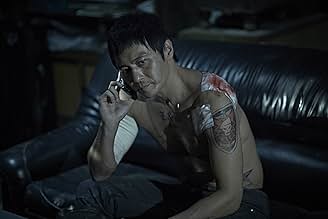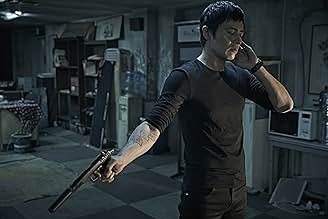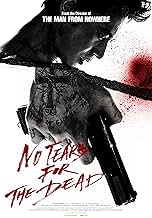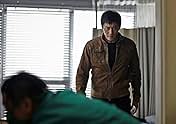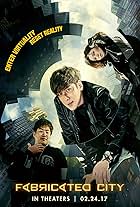IMDb RATING
6.7/10
7.6K
YOUR RATING
A hit man traumatized from accidentally killing a young girl during a job is given the mission to eliminate her mother, and begins the ultimate fight to save her life.A hit man traumatized from accidentally killing a young girl during a job is given the mission to eliminate her mother, and begins the ultimate fight to save her life.A hit man traumatized from accidentally killing a young girl during a job is given the mission to eliminate her mother, and begins the ultimate fight to save her life.
- Director
- Writer
- All cast & crew
- Production, box office & more at IMDbPro
Featured reviews
The movie is about a hit man from America's mid-west who is of Korean decent. When he botches what was supposed to be his last job by killing an innocent kid, he is sent to Korea to fix what he screwed up by killing the kid's mother.
It sounds a bit like a fish out of water story, but the movie only proves that the crime world is the crime world no matter what country you are from. Some of the criminals were speaking up to three different languages, but in the crime game there are only two languages in you really need to know money and guns.
The gun part was not as much as the money part but when the gun part was done it was violent, like Chow Yun Fat 80's style violent. The action sequences were stylish and bloody, just how I like it
The money part is where all the crime Drama comes in as it's about a Korean gang uses a legit network to launder Triad money, The plot tries to be complex with the an everyone is not who they seem kind of situation. They film also tries to give some depth to the main character showing us why a harden hit man would allow an accidentally killing to melt his heart like it did. For me the story was not as complex as the action sequences.
Some of the midsection could use more gun play, but overall it was a great seeing it.
It sounds a bit like a fish out of water story, but the movie only proves that the crime world is the crime world no matter what country you are from. Some of the criminals were speaking up to three different languages, but in the crime game there are only two languages in you really need to know money and guns.
The gun part was not as much as the money part but when the gun part was done it was violent, like Chow Yun Fat 80's style violent. The action sequences were stylish and bloody, just how I like it
The money part is where all the crime Drama comes in as it's about a Korean gang uses a legit network to launder Triad money, The plot tries to be complex with the an everyone is not who they seem kind of situation. They film also tries to give some depth to the main character showing us why a harden hit man would allow an accidentally killing to melt his heart like it did. For me the story was not as complex as the action sequences.
Some of the midsection could use more gun play, but overall it was a great seeing it.
Ironically, No Tears for the Dead, a film with themes concerning honor, power and greed, is strongly focused on mourning the deceased, conveyed emotionally through the plot, which concerns death and suicide. This subsequently reveals how simple it is to take a life, and how pointless it can often appear, while suggesting that the execution of an individual goes much deeper, the impact killing their closest friends and family who must suffer the pain, and the consequences, of their passing.
When we first meet Mo-Kyung (Kim Min-Hee), it is difficult to discern if she is aware of the tragic loss she has suffered, the professional climate she inhabits forcing her to work as she hides much of her pain, after having lost both her daughter, the adorable Yoo-Mi (Kang Ji-Woo) and husband, while the two were overseas. The use of contextualization over the duration of the feature layers the emotional depth over time, Ms. Min-Hee being responsible for one of the film's most poignantly incredible scenes, that is especially due to her exceptional talent.
However, she is not the only person suffering from this loss. Gon (Jang Dong-Gun), the hit-man responsible for inadvertently snatching away Yoo-Mi's life, a character who often appears stoic and emotionally impotent, is plagued by the trauma of his wrongdoing, while also suffering the pain of his past, the consequences of which inevitably formed his character's views and values. This pain only grows stronger as the narrative progresses, though the motivations that inspire this are largely conveyed visually, rather than being further scaffolded through dialogue, the feature, at one point, reducing this sub-plot to little more than a stereotypical cliché. Gon's inability to hide his regret is largely caused by the order he receives to terminate Mo-Kyung, to ensure she does not ask unwanted questions, in an attempt to shelter other antagonists involved in the corruption and money laundering schemes, including the vile John Lee (Kim Joon-Sung), from being apprehended by police.
Originally beginning in Los Angeles, before moving to South Korea, at least half the script is presented in English, and not only is this written in an exemplary fashion (which, unfortunately, isn't always the case with Asian movies - I'm looking at you The Viral Factor), the actors speak their lines of dialogue with educated professionalism.
As Gon fights his personal moral battles, those giving the orders begin to doubt his resolve, leading them to send his brother in arms, Charles (Brian Tee), and his proficient team, to complete his assignment, friendship and loyalty being major themes that begin to be contended. The battles that ensue are absolutely outstanding, not only being incredibly violent, sometimes hilariously so, but being intelligently thought out, as the characters attempt to out-think each other, rather than simply using brutality. In many of these instances, characters are horrifically wounded, and yet unrealistically survive, this tactic seemingly granting the plot further longevity, which may cause some viewer's to question the necessity of this action.
Occasionally, the directionality of the plot and character progression can become predictable, though that doesn't mean the film is not without its surprises. The characters, especially the villains, are capable of making dialogue reflective of black humor, though at the same time, enemies, despite exhibiting recognizable influences, can appear a little two-dimensional.
Despite the ending been quite a surprise, while beneficially fitting the narrative, the conclusion raises additional questions that are unresolved, providing limited closure, while the fate of one of the leads is entirely uncertain. Audiences throughout the story may be hoping for Gon's character to find redemption or forgiveness, and in the end, a question worth asking is: are we satisfied?
Although No Tears for the Dead is viciously entertaining, emotionally poignant, and efficaciously acted and directed, more depth could have been provided to truly resolve some of the film's most impacting story-lines.
When we first meet Mo-Kyung (Kim Min-Hee), it is difficult to discern if she is aware of the tragic loss she has suffered, the professional climate she inhabits forcing her to work as she hides much of her pain, after having lost both her daughter, the adorable Yoo-Mi (Kang Ji-Woo) and husband, while the two were overseas. The use of contextualization over the duration of the feature layers the emotional depth over time, Ms. Min-Hee being responsible for one of the film's most poignantly incredible scenes, that is especially due to her exceptional talent.
However, she is not the only person suffering from this loss. Gon (Jang Dong-Gun), the hit-man responsible for inadvertently snatching away Yoo-Mi's life, a character who often appears stoic and emotionally impotent, is plagued by the trauma of his wrongdoing, while also suffering the pain of his past, the consequences of which inevitably formed his character's views and values. This pain only grows stronger as the narrative progresses, though the motivations that inspire this are largely conveyed visually, rather than being further scaffolded through dialogue, the feature, at one point, reducing this sub-plot to little more than a stereotypical cliché. Gon's inability to hide his regret is largely caused by the order he receives to terminate Mo-Kyung, to ensure she does not ask unwanted questions, in an attempt to shelter other antagonists involved in the corruption and money laundering schemes, including the vile John Lee (Kim Joon-Sung), from being apprehended by police.
Originally beginning in Los Angeles, before moving to South Korea, at least half the script is presented in English, and not only is this written in an exemplary fashion (which, unfortunately, isn't always the case with Asian movies - I'm looking at you The Viral Factor), the actors speak their lines of dialogue with educated professionalism.
As Gon fights his personal moral battles, those giving the orders begin to doubt his resolve, leading them to send his brother in arms, Charles (Brian Tee), and his proficient team, to complete his assignment, friendship and loyalty being major themes that begin to be contended. The battles that ensue are absolutely outstanding, not only being incredibly violent, sometimes hilariously so, but being intelligently thought out, as the characters attempt to out-think each other, rather than simply using brutality. In many of these instances, characters are horrifically wounded, and yet unrealistically survive, this tactic seemingly granting the plot further longevity, which may cause some viewer's to question the necessity of this action.
Occasionally, the directionality of the plot and character progression can become predictable, though that doesn't mean the film is not without its surprises. The characters, especially the villains, are capable of making dialogue reflective of black humor, though at the same time, enemies, despite exhibiting recognizable influences, can appear a little two-dimensional.
Despite the ending been quite a surprise, while beneficially fitting the narrative, the conclusion raises additional questions that are unresolved, providing limited closure, while the fate of one of the leads is entirely uncertain. Audiences throughout the story may be hoping for Gon's character to find redemption or forgiveness, and in the end, a question worth asking is: are we satisfied?
Although No Tears for the Dead is viciously entertaining, emotionally poignant, and efficaciously acted and directed, more depth could have been provided to truly resolve some of the film's most impacting story-lines.
If you enjoyed "The Man From Nowhere", you will most likely enjoy this as well. It's not nearly as flawless as "The Man From Nowhere" which I will explain shortly.
The reason I bring up the "The Man From Nowhere" is that "No Tears For the Dead" (or "Crying Man" in Korean) is a very similar movie but shot on an entirely different canvas. What I mean is you have the typical protagonist or anti-hero with a vague background that gets slowly revealed and starts developing a conscience after botching his last assignment when he accidentally kills an innocent child. He is then hired to go after the child's mother but can't bring himself to do it after he starts developing feelings for her and races to save her from his and her employers.
"No Tears For the Dead" is in no way original and the story is almost forgettable since it's been done to death but the action sequences are what makes it stand apart. The bloody and brutal fight/shooting scenes gets your adrenaline going throughout the movie. The night shots of Los Angeles are especially gorgeous which reminded me of Michael Mann's signature visual shots of Los Angeles in his flawless crime thrillers, "Heat" and "Collateral".
The lack of character development in "No Tears For the Dead" is what makes "The Man From Nowhere" so much better. In "The Man From Nowhere", you actually cared about the characters and what the protagonist goes through to save his neighbor's child. Here, it is almost nonexistent since the action sequences leave no time for them to get acquainted. However, both use the exact same format of revealing the protagonists' past that made them become who they were and it is also effectively done in "No Tears For the Dead". I came to care about the protagonist but there should've been more between the killer and mother.
The ending was also disappointing since it wasn't clear what really happens to everyone. But the final scene was a good way to end the movie on a tragic note which pretty much explains the title of the movie.
Overall, it's not as good as "The Man From Nowhere" in terms of plot and character development, but "No Tears for the Dead" is nevertheless another enjoyable entry from its director.
The reason I bring up the "The Man From Nowhere" is that "No Tears For the Dead" (or "Crying Man" in Korean) is a very similar movie but shot on an entirely different canvas. What I mean is you have the typical protagonist or anti-hero with a vague background that gets slowly revealed and starts developing a conscience after botching his last assignment when he accidentally kills an innocent child. He is then hired to go after the child's mother but can't bring himself to do it after he starts developing feelings for her and races to save her from his and her employers.
"No Tears For the Dead" is in no way original and the story is almost forgettable since it's been done to death but the action sequences are what makes it stand apart. The bloody and brutal fight/shooting scenes gets your adrenaline going throughout the movie. The night shots of Los Angeles are especially gorgeous which reminded me of Michael Mann's signature visual shots of Los Angeles in his flawless crime thrillers, "Heat" and "Collateral".
The lack of character development in "No Tears For the Dead" is what makes "The Man From Nowhere" so much better. In "The Man From Nowhere", you actually cared about the characters and what the protagonist goes through to save his neighbor's child. Here, it is almost nonexistent since the action sequences leave no time for them to get acquainted. However, both use the exact same format of revealing the protagonists' past that made them become who they were and it is also effectively done in "No Tears For the Dead". I came to care about the protagonist but there should've been more between the killer and mother.
The ending was also disappointing since it wasn't clear what really happens to everyone. But the final scene was a good way to end the movie on a tragic note which pretty much explains the title of the movie.
Overall, it's not as good as "The Man From Nowhere" in terms of plot and character development, but "No Tears for the Dead" is nevertheless another enjoyable entry from its director.
NO TEARS FOR THE DEAD is yet another addition to an exemplary list of South Korean action thrillers made in the last decade; such titles include THE BERLIN FILE, THE MAN FROM NOWHERE, A BITTERSWEET LIFE, A COMPANY MAN, and THE SUSPECT. I was long excited for this film as soon as I found out it was a follow-up to the same director's THE MAN FROM NOWHERE, which is one of my all-time favourites.
NO TEARS FOR THE DEAD isn't quite up there with the standard of the earlier film, but it has its moments. This is an exciting story that mixes superbly-shot, hard-hitting action sequences with a tragic human drama at the core. It's dark indeed, featuring heartfelt performances from the central actors who are inevitably playing broken characters, and it's fun to see how the tone shifts from adrenaline-pumping action to gut-wrenching emotion and back again.
The storyline is predictable for the genre: an assassin screws up by failing to take out his intended victim, only to face the wrath of his former employers. The action is blistering, with lightning fast editing and gobbets of grisly violence. But the human drama also draws you in, building to a moving but expected ending. The South Koreans have come up trumps again with this one.
NO TEARS FOR THE DEAD isn't quite up there with the standard of the earlier film, but it has its moments. This is an exciting story that mixes superbly-shot, hard-hitting action sequences with a tragic human drama at the core. It's dark indeed, featuring heartfelt performances from the central actors who are inevitably playing broken characters, and it's fun to see how the tone shifts from adrenaline-pumping action to gut-wrenching emotion and back again.
The storyline is predictable for the genre: an assassin screws up by failing to take out his intended victim, only to face the wrath of his former employers. The action is blistering, with lightning fast editing and gobbets of grisly violence. But the human drama also draws you in, building to a moving but expected ending. The South Koreans have come up trumps again with this one.
The first half of this movie is rough to get through, with the exception of the initial scene, which sinks its hooks into you as any first scene of a movie should. But then it drags, painfully, and hits you with waves of cliches, the helpless damsel in distress being the most tiring for me. The action scenes are brutal and well filmed though, which in addition to the great acting saves this from damnation. The emotional ending I also have to applaud, and the climactic scene that precedes it.
Storyline
Did you know
- TriviaIn order to get in character, JANG Dong-gun underwent intense training physically and mentally. He trained with a U.S. special operations unit so that he could move like the killer Gon is and even read essays by real adoptees to truly understand his character's emotions and trauma.
- GoofsNo people resides in the building where the Cops are killed. There were bomb blast and Gun firing and so on but no person came out of their houses.
- Alternate versionsIn the original version the title appears in Korean and there are Korean captions for the English dialogues, while in the international version the title appears in English with no captions.
- ConnectionsReferenced in Taapmaan
- SoundtracksSmooth Operator
Written by Sade (uncredited) and Ray St. John (uncredited)
- How long is No Tears for the Dead?Powered by Alexa
Details
Box office
- Gross US & Canada
- $63,063
- Opening weekend US & Canada
- $8,329
- Jun 15, 2014
- Gross worldwide
- $89,813
- Runtime1 hour 56 minutes
- Color
- Sound mix
- Aspect ratio
- 2.35 : 1
Contribute to this page
Suggest an edit or add missing content





